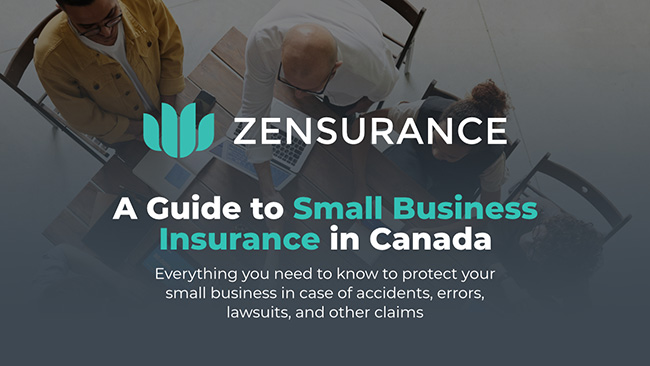Starting a small business is a big decision but a potentially life changing one. The journey into entrepreneurship can be daunting, and figuring out where and how to begin is often the first major challenge.
This brief guide aims to simplify the process of starting a business in British Columbia (B.C.). It will cover essential legal requirements, strategies for structuring your company, and how to safeguard it against unforeseen events with a comprehensive business insurance policy.
Let’s go through the 10 vital steps you’ll need to take to bring your entrepreneurial ambitions to fruition.

Related Posts
Categories
10 Steps for Starting a Small Business in B.C.
Follow our checklist with these 10 steps for starting a small business in British Columbia:
1. Decide and Develop Your Business Idea
What type of business do you want to launch? What products or services do you want to provide that may not be available locally in your part of the province? These aren’t always easy questions to answer off the hop.
The key to deciding lies in your existing skills, passions, interests, and experience. Regarding skills and experience, these can be developed as you grow, but choosing to launch a startup based on your experience, knowledge, and creativity can steer you in the right direction.
Taking this approach can achieve two key benefits: stimulating your passion and drive, making the venture more rewarding, and, importantly, instilling confidence in customers, prospects, and partners. People are more likely to trust and do business with a company that they know is led by an expert in their field.
2. Test Your Business Idea
After deciding on the type of business you’ll be launching, it’s time to test it to see how it might do in the real world. Testing your business idea before committing fully can help save time, money, and effort.
There are a few ways entrepreneurs in B.C. can evaluate their potential for success:
- Do market research: Identify who your potential customers are and what their needs are that your venture can solve or provide. Do a deep dive on who your competitors are and what they offer – are there any weaknesses or opportunities they’re missing that you can satisfy?
Find out what the demand is for your products and services in your community or region of B.C. Conducting online surveys and interviewing potential customers can give insight into whether your business will appeal to them.
Know the industry you’re entering and if that market is growing or shrinking by reviewing government statistics, publicly available reports, and reading relevant trade publications to get a lay of the land. - Do customer validation: As part of your research efforts interviewing potential customers, find out if what you’re offering is of value to them.
Try offering your product or service to your target customer audience, even if it’s still a work in progress, to see if people are willing to pay upfront for it. If they are, that’s a strong indication that market demand is there. Creating a minimum viable product (a basic or low-cost version of your product or service) and launching it to a select group of people is a terrific way to gather feedback and improve your offering. Conducting a small-scale pilot with customers can help measure potential sales, customer satisfaction, and repeat customers by showcasing your business at a farmers’ market, street festival, or a temporary pop-up shop.
- Do a feasibility study: Estimate your business’s startup costs and operating expenses (including the taxes you’re required to pay in B.C.), and outline what your potential revenue would be based on what you intend to charge for products and services. Doing this helps establish what your break-even number is in terms of the amount of sales you need to cover all costs.
3. Select a Business Name
What’s in a name? Everything!
A unique and memorable business name clearly communicates your business’s purpose and values. It’s a powerful tool for building brand awareness, cultivating customer loyalty, driving sales, and attracting talent for future growth.
Entrepreneurs in B.C. are required to request a business name through B.C. Registries and Online Services. However, there are exceptions to this requirement.
If your startup venture is federally incorporated, a sole proprietorship running under your legal name, or if you’d prefer, the name of your entity is the nine-digit business number assigned to it by the Canada Revenue Agency (CRA). A business number is automatically provided to new B.C.-based corporations and businesses as part of the registration or incorporation process.
It’s also worthwhile to check Canada’s two national name databases to ensure your business name is not identical or too similar to an existing registered business or trademark:
1. NUANS (Newly Upgraded Automated Name Search), the Canadian corporate names and trademarks database, provides a list of names and trademarks similar or identical to the one searched.
2. Canada’s business registries offer a way to check name availability across federal and provincial jurisdictions through the official registries of corporations in Canada, Alberta, British Columbia, Manitoba, Nova Scotia, Ontario, Quebec, and Saskatchewan.
4. Choose an Ownership Structure and Register the Business
Choosing an ownership structure for your new business is necessary to establish your business as a recognized legal entity and to comply with provincial and federal laws.
You will need to do so to open a business bank account, sign various contracts, and collect taxes. Ownership structures define how your business will operate legally, financially, and operationally, while registration makes it official and compliant with provincial law.
There are three common business ownership structures in B.C. you can choose from:
- Sole proprietorship: A sole proprietorship is not a separate legal entity, meaning your business name is the same as your legal name. It also means you’re responsible for all liabilities, debts, and obligations, and your income is taxed as personal income.
It’s the simplest and most cost-effective way to start a business, and is regarded as the best option for small, low-risk businesses. - Partnership: A partnership is also not a separate legal entity, but two or more partners share in the ownership. The partners share the business’s liability, and the business’s income is divided and taxed by each partner.
The cost is low to moderate to establish this type of business. It is considered the right option for startups with at least two founders who trust one another and wish to share the responsibility of ownership. - Corporation: A corporation is a separate legal entity from the owner or owners, and the corporation’s owners or shareholders are not personally responsible for the entity’s liabilities and debts.
There are possible tax benefits in choosing this type of structure, as the corporation pays corporate taxes and the owners pay personal taxes on their salaries and dividends. However, the cost of starting a corporation is higher and involves fees, as well as legal and accounting expenses. Corporations are required to file annual reports, and their financial information is publicly available.
The B.C. provincial government provides more information on choosing the type of business structure and the legal and financial implications that go with each option.
5. Get Necessary Business Licences and Permits
There are business licences and permits your company will need to operate legally.
A quick way to determine what regulations might affect your business is to use BizPal. BizPaL is free to use, and it’s available 24/7. It helps new business owners identify what they may need from the federal government, the B.C. provincial government, and more than 130 communities and municipalities in B.C.
You can also use the provincial government’s OneStop Business Registration service to register with multiple public sector agencies and local governments in one step without having to duplicate processes.
Also, if you intend to hire employees, you will need to register with WorkSafeBC – British Columbia’s provincial workplace health and safety agency. WorkSafeBC develops and enforces occupational health and safety regulations, and administers workers’ compensation coverage in the province.
It’s worth noting that WorkSafeBC (workers’ comp) and employers’ liability insurance complement each other and help ensure the protection of both employees and business owners.
6. Draft a Business Plan
A business plan is a formal document that outlines your business vision and acts as a guide to drive your activities. It’s like a roadmap or blueprint that tells you where you want to go, how to get there, and what to do along the way.
It can significantly increase your chances of obtaining financing and achieving your goals by helping to communicate your vision to potential investors, lenders, and stakeholders.
It also helps identify if any gaps in your business should be addressed before you officially launch your venture.
7. Register to Collect GST and PST
Every B.C. entrepreneur may need to register to collect provincial sales tax (PST) and to collect the federal goods and services tax (GST).
PST is a provincial retail sales tax. It applies when a taxable good or service is purchased or brought into B.C. Therefore, if you rent or sell taxable goods or services, you might be required to register with the B.C. Ministry of Finance to charge and collect PST. In general, the rate of the B.C. PST is 7%, although there are some exceptions. If you are required to collect and pay PST, you can take advantage of eTaxBC to file returns and pay your taxes.
If you sell or provide goods and services in Canada and your annual worldwide GST taxable sales are more than $30,000, you may need to register to collect and pay GST through the CRA.
8. Purchase Comprehensive Business Insurance
Purchasing a comprehensive business insurance policy to protect your finances and reputation from unexpected accidents, damages, or incidents is vital to every B.C. business owner’s financial wellbeing.
It’s also required to obtain financing, or to lease or buy a commercial property. Furthermore, your potential customers may not do business with you if you’re not insured. A Zensurance survey of Canadian consumers found a combined 96.4% say it’s ‘very important’ or ‘somewhat important’ for a business to carry insurance.
9. Get Business Financing
Starting a new small business requires an investment of both time and money. If not from the get-go, there may come a time when you need to seek additional funding or financing to grow your new venture.
There are different options for doing so, including:
- Getting a loan and a line of credit from a financial institution.
- Seeking funding opportunities through the B.C. government.
- For women business owners and entrepreneurs, financing and advisory services are available through WeBC.
- Utilizing programs and services through the federal government
- Applying for business grants from a broad range of private companies, financial institutions, and nonprofit organizations.
- Seeking angel investors or conducting crowdfunding.
10. Establish a Website and Online Presence
Even if your startup venture is a brick-and-mortar storefront business or provides services to customers in person, you’ll need a snazzy website and online presence to help your customers find you online and learn about your products and services.
You don’t need to break the bank to establish an effective website. There are affordable and easy-to-use website builder options available.
It’s also worthwhile to take advantage of social media networks to make your presence known online and to attract people to visit your website or contact you directly.
You can also leverage the power of email marketing to grow and nurture your business by encouraging people to sign up to receive a monthly email highlighting your services and promotions, and creating your own inexpensive videos to share on social media and your website can also drive engagement.
Additional Resources for Starting a Business in B.C.
There are many freely available resources for B.C. entrepreneurs and new business owners to establish and grow their businesses, including:
- Community Futures British Columbia provides support for entrepreneurs at every stage with a variety of programs, services, and funding options.
- The Small Business Accelerator through the University of British Columbia offers free access to reliable business information and tools for secondary market research for B.C. businesses and entrepreneurs.
- Innovate B.C. is dedicated to fostering innovation in British Columbia through a broad range of programs.
- The Business Development Bank of Canada offers financing solutions and resources to help entrepreneurs with business planning.
- Futurpreneur Canada is a national, non-profit organization that provides various programs and services for entrepreneurs and startups, including connecting aspiring business owners with experienced business mentors.
Protect Your B.C. Business: Get Customized, Low-Cost Liability Insurance Now
Zensurance is Canada’s leading small business insurance brokerage. We help protect Canadian small business owners, entrepreneurs, and self-employed professionals across hundreds of industries with customized, low-cost business liability insurance.
Complete our online application for a free insurance quote in less than five minutes.
Let our team of knowledgeable, licensed insurance brokers find the right coverage for your new business through our partner network of over 50 insurers, tailor it to suit your needs and budget, and issue your policy documents and a certificate of insurance in 48 hours or less, so you can build and thrive with confidence.
– Reviewed by Brandon Bowie, Senior Broker and Team Lead, Professional Lines, Zensurance.
Recent Posts
Why E-Commerce Insurance Matters for Online Sellers in Canada
If you sell products online in Canada, e-commerce insurance – also known as online business insurance – is essential to protect your finances, inventory, and reputation. Here’s what online sellers, dropshippers, and small e-commerce businesses in Canada need to know.
What Happens If Your Small Business Gets Sued in Canada?
Being sued as a small business owner can be financially and emotionally overwhelming. Legal defence costs can quickly climb into the tens of thousands of dollars. This article explains what happens when your business is sued, how business liability insurance can help cover legal fees, and how to reduce your risk of being sued in the first place.
8 Real Business Insurance Claims Canadian Small Businesses Filed in 2025
Accidents, mistakes, theft, and bad luck don’t discriminate. Here are 8 real business insurance claims small business owners in Canada filed in 2025 – and how the right coverage helped them recover fast and keep moving forward.









